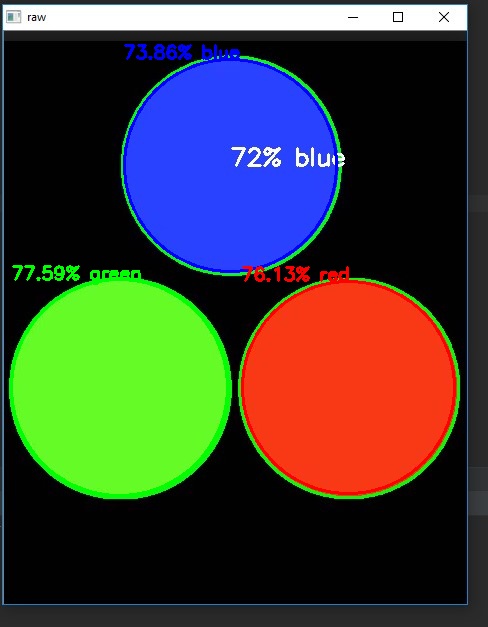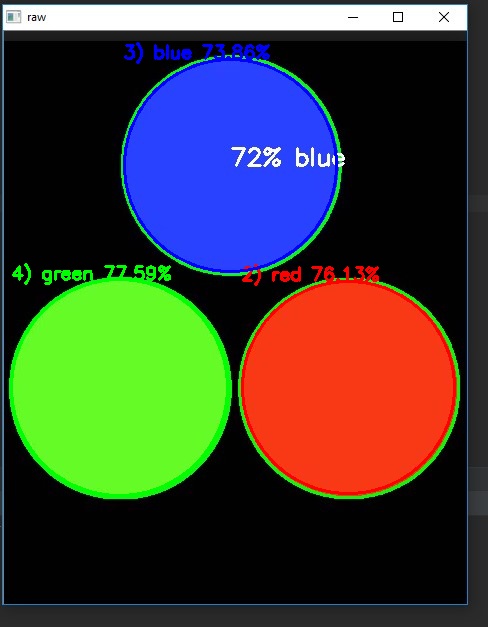This forum is disabled, please visit https://forum.opencv.org
 | 1 | initial version |
@Erdal. You should learn to read OpenCV book. You shouldn't gone too far. Reasoning why, you shouldn't write too many cv2.waitKey commands. But cv2.imshow should be ok, but manipulate before waitKey and destroyAllWindows. The putText should be reduced to one instead of multiples. The dictionary is easys, because I reduced codes line by libne.The coded you wrote as above doesn't have while condition block. Without condition. you merely got one colour of blue. Here is code:
#!!usr/bin/env python3
#Raspberry pi 3, Strecth
#Date: 19th February, 2019.
import numpy as np
import cv2
# define the lower and upper boundaries of the colors in the HSV color space
lower = {'red':(0,80,80),
'green':(35,21,62),
'blue':(97,100,117),
'yellow':(23,59,119),
'orange':(10,100,20)
}
upper = {'red':(20,255,255),
'green':(55,255,255),
'blue':(117,255,255),
'yellow':(43,255,255),
'orange':(30,255,255)
}
# define standard colors for circle around the object
colors = {'red':(0,0,255),
'green':(0,255,0),
'blue':(255,0,0),
'yellow':(0,255,217),
'orange':(0,140,255)
}
font = cv2.FONT_HERSHEY_SIMPLEX
while True:
# grab the current frame
frame = cv2.imread('color.jpg')
blurred = cv2.GaussianBlur(frame,(11,11),0)
hsv = cv2.cvtColor(blurred,cv2.COLOR_BGR2HSV)
#for each color in dictionary check object in frame
for key, value in upper.items():
kernel = np.ones((9,9),np.uint8)
mask = cv2.inRange(hsv,lower[key],upper[key])
mask = cv2.morphologyEx(mask,cv2.MORPH_OPEN,kernel)
mask = cv2.morphologyEx(mask,cv2.MORPH_CLOSE,kernel)
#Calculate percentage of pixel colors
output = cv2.countNonZero(mask)
res = np.divide(float(output),mask.shape[0]*int(mask.shape[1] / 128))
percent_colors = np.multiply((res),400) / 10000
percent=(np.round(percent_colors*100,2))
cnts = cv2.findContours(mask.copy(),cv2.RETR_LIST,cv2.CHAIN_APPROX_SIMPLE)[-2]
center = None
if len(cnts) > 0:
c = max(cnts, key=cv2.contourArea)
((x,y), radius) = cv2.minEnclosingCircle(c)
M = cv2.moments(c)
center = (int(M["m10"] / M["m00"]),int(M["m01"] / M["m00"]))
if radius > 0.5:
cv2.circle(frame,(int(x),int(y)),int(radius),colors[key],2)
cv2.putText(frame,
str(percent) + '% ' +key,
(int(x-radius),int(y-radius)),
font,
0.6,
colors[key],
2)
cv2.imwrite('Colors.jpg', frame)
cv2.imshow("Frame",frame)
key = cv2.waitKey(1)
if key == ord("q"):
break
camera.release()
cv2.destroyAllWindows()
Output:

 | 2 | No.2 Revision |
@Erdal. @Erdal.J. You should learn to read OpenCV book. You shouldn't gone too far. Reasoning why, you shouldn't write too many cv2.waitKey commands. But cv2.imshow should be ok, but manipulate before waitKey and destroyAllWindows. The putText should be reduced to one instead of multiples. The dictionary is easys, because I reduced codes line by libne.The coded you wrote as above doesn't have while condition block. Without condition. you merely got one colour of blue. Here is code:
#!!usr/bin/env python3
#Raspberry pi 3, Strecth
#Date: 19th February, 2019.
import numpy as np
import cv2
# define the lower and upper boundaries of the colors in the HSV color space
lower = {'red':(0,80,80),
'green':(35,21,62),
'blue':(97,100,117),
'yellow':(23,59,119),
'orange':(10,100,20)
}
upper = {'red':(20,255,255),
'green':(55,255,255),
'blue':(117,255,255),
'yellow':(43,255,255),
'orange':(30,255,255)
}
# define standard colors for circle around the object
colors = {'red':(0,0,255),
'green':(0,255,0),
'blue':(255,0,0),
'yellow':(0,255,217),
'orange':(0,140,255)
}
font = cv2.FONT_HERSHEY_SIMPLEX
while True:
# grab the current frame
frame = cv2.imread('color.jpg')
blurred = cv2.GaussianBlur(frame,(11,11),0)
hsv = cv2.cvtColor(blurred,cv2.COLOR_BGR2HSV)
#for each color in dictionary check object in frame
for key, value in upper.items():
kernel = np.ones((9,9),np.uint8)
mask = cv2.inRange(hsv,lower[key],upper[key])
mask = cv2.morphologyEx(mask,cv2.MORPH_OPEN,kernel)
mask = cv2.morphologyEx(mask,cv2.MORPH_CLOSE,kernel)
#Calculate percentage of pixel colors
output = cv2.countNonZero(mask)
res = np.divide(float(output),mask.shape[0]*int(mask.shape[1] / 128))
percent_colors = np.multiply((res),400) / 10000
percent=(np.round(percent_colors*100,2))
cnts = cv2.findContours(mask.copy(),cv2.RETR_LIST,cv2.CHAIN_APPROX_SIMPLE)[-2]
center = None
if len(cnts) > 0:
c = max(cnts, key=cv2.contourArea)
((x,y), radius) = cv2.minEnclosingCircle(c)
M = cv2.moments(c)
center = (int(M["m10"] / M["m00"]),int(M["m01"] / M["m00"]))
if radius > 0.5:
cv2.circle(frame,(int(x),int(y)),int(radius),colors[key],2)
cv2.putText(frame,
str(percent) + '% ' +key,
(int(x-radius),int(y-radius)),
font,
0.6,
colors[key],
2)
cv2.imwrite('Colors.jpg', frame)
cv2.imshow("Frame",frame)
key = cv2.waitKey(1)
if key == ord("q"):
break
camera.release()
cv2.destroyAllWindows()
Output:

 | 3 | No.3 Revision |
@Erdal.J. You should learn to read OpenCV book. You shouldn't gone too far. Reasoning why, you shouldn't write too many cv2.waitKey commands. But cv2.imshow should be ok, but manipulate before waitKey and destroyAllWindows. The putText should be reduced to one instead of multiples. The dictionary is easys, because I reduced codes line by libne.The coded you wrote as above doesn't have while condition block. Without condition. you merely got one colour of blue. Here is code:
#!!usr/bin/env python3
#Raspberry pi 3, Strecth
#Date: 19th February, 2019.
import numpy as np
import cv2
# define the lower and upper boundaries of the colors in the HSV color space
lower = {'red':(0,80,80),
'green':(35,21,62),
'blue':(97,100,117),
'yellow':(23,59,119),
'orange':(10,100,20)
}
upper = {'red':(20,255,255),
'green':(55,255,255),
'blue':(117,255,255),
'yellow':(43,255,255),
'orange':(30,255,255)
}
# define standard colors for circle around the object
colors = {'red':(0,0,255),
'green':(0,255,0),
'blue':(255,0,0),
'yellow':(0,255,217),
'orange':(0,140,255)
}
font = cv2.FONT_HERSHEY_SIMPLEX
while True:
# grab the current frame
frame = cv2.imread('color.jpg')
blurred = cv2.GaussianBlur(frame,(11,11),0)
hsv = cv2.cvtColor(blurred,cv2.COLOR_BGR2HSV)
#for each color in dictionary check object in frame
for key, value in upper.items():
kernel = np.ones((9,9),np.uint8)
mask = cv2.inRange(hsv,lower[key],upper[key])
mask = cv2.morphologyEx(mask,cv2.MORPH_OPEN,kernel)
mask = cv2.morphologyEx(mask,cv2.MORPH_CLOSE,kernel)
#Calculate percentage of pixel colors
output = cv2.countNonZero(mask)
res = np.divide(float(output),mask.shape[0]*int(mask.shape[1] / 128))
percent_colors = np.multiply((res),400) / 10000
percent=(np.round(percent_colors*100,2))
cnts = cv2.findContours(mask.copy(),cv2.RETR_LIST,cv2.CHAIN_APPROX_SIMPLE)[-2]
center = None
if len(cnts) > 0:
c = max(cnts, key=cv2.contourArea)
((x,y), radius) = cv2.minEnclosingCircle(c)
M = cv2.moments(c)
center = (int(M["m10"] / M["m00"]),int(M["m01"] / M["m00"]))
if radius > 0.5:
cv2.circle(frame,(int(x),int(y)),int(radius),colors[key],2)
cv2.putText(frame,
str(percent) + '% ' +key,
(int(x-radius),int(y-radius)),
font,
0.6,
colors[key],
2)
cv2.imwrite('Colors.jpg', frame)
cv2.imshow("Frame",frame)
key = cv2.waitKey(1)
if key == ord("q"):
break
camera.release()
cv2.destroyAllWindows()
Output:

If you want index. I still having huge problem. Because I'm using dictionary instead of list. I will have to work around. I couldn't get index ordered. But It will take a time to get back.
for i in range(1,len(key)):
r =i
if radius > 0.5:
cv2.circle(frame,(int(x),int(y)),int(radius),colors[key],2)
cv2.putText(frame,
str(r) + ') '+ key + ' '+ str(percent) + '% ' ,
(int(x-radius),int(y-radius)),
font,
0.6,
colors[key],
2
)
Output:
